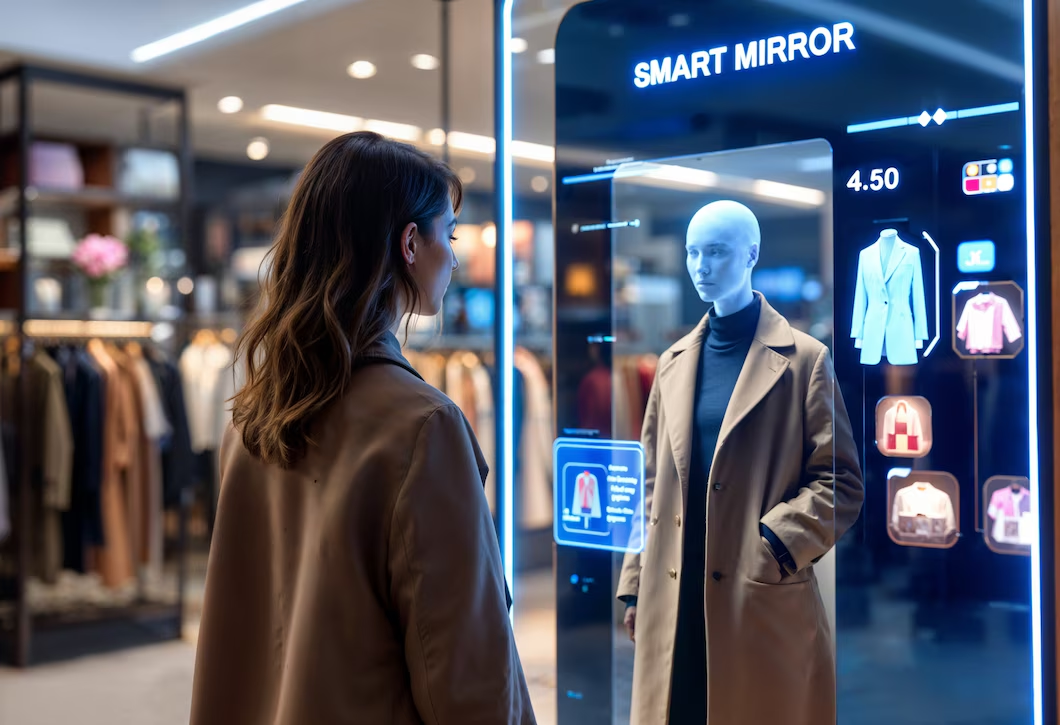Shopping AI agents are not a fantasy anymore — it is one of the rapidly expanding markets and a growing portion of customer experiences. The AI agents market around the world expanded from circa 5.4 billion in 2024 to an estimated 7.6 billion in 2025, and the analysts predict the market to grow dramatically over the remaining decade.
But AI adoption has not been very high: surveys indicate that only 34 per cent of American consumers would have an AI assistant shop on their behalf, and though more people are becoming aware of AI shopping assistants (43 per cent aware), fewer are actually using these assistants (14 per cent have used one). The potential to create smarter, safer experiences within the capabilities-versus-trust dichotomy is where retailers and AI Agent Development Companies and around the world can leverage their opportunities.
What makes AI agents different from chatbots, and why is that important?
The initial chatbots were weak and programmed. Contemporary AI agents integrate large language models, search through a retailer’s catalogue and policies, real-time stock checks, personalization cues, and even multimodal inputs (text and image). That enables them to be guided discovery (assisting a shopper to locate the appropriate item), autonomous (saving cart and checkout proposals), and post-purchase service (returns, tracking, upsells) – all in one seamless flow.
It is not the improved FAQ: it is a smart assistant that will combine product expertise, brand voice, and trade regulations to behave less like a robot than a knowledgeable store clerk.
Concrete ways AI agents change the shopping experience
Faster, hyper-relevant discovery
AI agents understand intent and context. Rather than pushing a shopper to guess search terms, natural-language (or image) processing agents surface curated results – e.g., “outfits to a humid beach wedding” – using inventory-aware recommendations. This minimizes any friction and the time spent on discovery to purchase.
Personalized, privacy-aware recommendations
Properly implemented AI agents take first-party data (purchases, returns, etc.), combine it with session signals and tailor the recommendations. They can justify the recommendation of a product (size fit, material, price range), and this increases the trust, in particular, together with clear data controls, outlined in straightforward language.
Multimodal interactions (text + images + voice)
Customers are able to post a photo (find boots like these) or chat with a representative while carrying out other activities. Multimodal AI agents provide mobile-first, natural browsing – which is essential, since mobile commerce is here to stay.
Conversational checkout and smart cart management
Agents can pre-fill shipping and payment, propose payment plans or highlight discounts. Some implementations can even make purchases with the permission of the shopper – speeding up conversion without compromising compliance and verification.
Better post-purchase experience and retention
Post-sale follow-ups, reorders, and smart returns are automated, minimize calls and creating loyalty. An effective AI Agent Development Solution will integrate CRM, logistics and customer-service policies into one conversational interface.
Business impact: metrics that move
Studies indicate that both conversational and AI-powered commerce can have a significant effect on revenue and efficiency: chat and assistant functions are said to boost e-commerce revenue by 7-25 per cent when used well, and AI personalization is said to boost revenues up to approximately 40 per cent in certain campaigns. In the meantime, conversational AI and AI agents are projected to experience high CAGR rates in the market- evidence that the investment is accelerating.
Nevertheless, adoption rates are also a concern: awareness and use are under capabilities, i.e. ROI is contingent on execution, trust-building and education.
The role of AI Agent Development Companies
India is an engineering centre for products and AI. Indian AI Agent Development Companies provide an attractive combination of engineering skills, domain (retail integrations, payments, logistics APIs) and cost-effectiveness. They often offer end-to-end AI Agent Development Solution stacks, including data pipelines and model fine-tuning as well as UI/UX and compliance validation, where retailers can get out of pilot to production in shorter timeframes.
Indian teams tend to be very good at uniting the various systems (ERP, OMS, PIM) such that the agent shows the right inventory and the right price – the difference between a wonderful suggestion and the sod-you-liked-it slapstick.
Design principles for effective AI shopping agents
1. First, be transparent — Inform users when communicating with AI and reveal how data is used.
2. Human-in-the-loop – Provide transparency to the human agent when necessary.
3. Actionable explanations —when recommending products, explain why.
4. Privacy and consent —Allow users to decide on personalization driven by data without being inconvenienced.
5. Measure and iterate – Measure conversion lift, average order value, NPS, and fallback rates to fine-tune models.
Any AI Agent Development Solution must include these principles as part of contracts with development partners.
Challenges and how to overcome them
Trust & transparency: Consumers are concerned with privacy and control. Counter this with clear prompts, granular consent, and audit trails for recommendations.
Precision & illusion: Retrieval-enhanced pipelines and stock audits minimise the chances of erroneous responses. Test extensively against real-world queries.
Complexity in integration: Select partners (or AI Agent Development Companies in India) which has established connectors in payments, logistics and tax regulations.
Legal compliance: Have a legal checksheet of the jurisdictions served; automated purchases must be well authenticated and fraud blocked.
Conclusion
Online shopping is being transformed by AI agents so that it is not a fixed list of products, but a relative and contextual experience. The technology and market energy do exist, but the victors will be retailers and partners who combine engineering strength with ethical design and operational discipline. To brands willing to leap, engaging an AI Agent Development Company or other vendors with experience can help them leap to a good demo and a reliable shopping companion, which is where customer delight (and revenues) is in earnest.

